Welcome to the SEDL Store
The Store allows you to purchase print copies of SEDL products. Use the tabbed interface below to explore resources by product type, or use the menus on the left to explore our products by subject area.
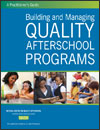 |
A Practitioner's Guide: Building and Managing Quality Afterschool Programs (2009) A Practitioner's Guide: Building and Managing Quality Afterschool Programs is designed to share with you the practices that can help you cover it all—great programming, terrific staff, positive relationships, and plenty of resources ... |
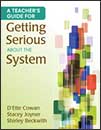 |
A Teacher's Guide for Getting Serious About the System (2012) This brief companion book to Getting Serious About the System: A Fieldbook for District and School Leaders provides teachers with background on systemic school improvement and illustrates where they and other stakeholders fit in the process ... |
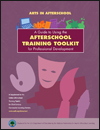 |
Arts in Afterschool: A Guide to Using the Afterschool Training Toolkit for Professional Development (2008) The six promising practices in afterschool for the arts identified in the Afterschool Training Toolkit are as follows: Building Skills in the Arts; Expressing Yourself Through the Arts; Making Connections to History and Culture; Thinking and Talking ... |
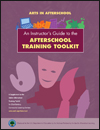 |
Arts in Afterschool: An Instructor's Guide to the Afterschool Training Toolkit (2008) The six promising practices in afterschool for the arts identified in the Afterschool Training Toolkit are as follows: Building Skills in the Arts; Expressing Yourself Through the Arts; Making Connections to History and Culture; Thinking and ... |
 |
Change Facilitator Stages of Concern Questionnaire (CFSoCQ) Online (2009) This product is an online version of the Change Facilitator Stages of Concern Questionnaire that can be completed online by many participants in a short amount of time. The product provides access for a "survey coordinator" to the online ... |
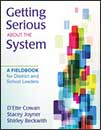 |
Getting Serious About the System: A Fieldbook for District and School Leaders (2012) This fieldbook shows how to avoid a haphazard approach to school improvement by focusing on all aspects of the system and on specific issues that have the most impact upon student achievement. This multidimensional process also entails increasing ... |
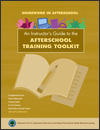 |
Homework in Afterschool: An Instructor's Guide to the Afterschool Training Toolkit (2008) The four promising practices in afterschool for homework help identified in the Afterschool Training Toolkit are as follows: Involving Day Schools, Families, and Communities; Managing and Organizing the Homework Environment; Monitoring and ... |
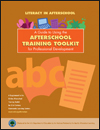 |
Literacy in Afterschool: A Guide to Using the Afterschool Training Toolkit for Professional Development (2008) The Afterschool Training Toolkit materials are designed to illustrate techniques and activities that leverage student curiosity to make literacy in afterschool both enjoyable and relevant. This guide provides professional development ideas for ... |
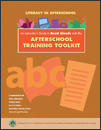 |
Literacy in Afterschool: An Instructor's Guide to Read Alouds with the Afterschool Training Toolkit (2008) The National Partnership for Quality Afterschool Learning developed this instructor’s guide to accompany its Afterschool Training Toolkit, a free online staff development tool. Both the guide and the ... |
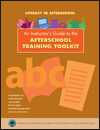 |
Literacy in Afterschool: An Instructor's Guide to the Afterschool Training Toolkit (2008) The six promising practices in student achievement in literacy identified in the Afterschool Training Toolkit are as follows: Book Discussion Groups and Literature Circles; Read Aloud; Story and Literature Dramatizations; Writing; Family Literacy ... |
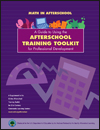 |
Math in Afterschool: A Guide to Using the Afterschool Training Toolkit for Professional Development (2008) The Afterschool Training Toolkit materials are designed to illustrate techniques and activities that leverage student curiosity to make mathematics in afterschool both enjoyable and relevant. This guide provides professional development ideas for ... |
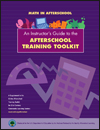 |
Math in Afterschool: An Instructor's Guide to the Afterschool Training Toolkit (2008) The seven promising practices in afterschool math identified in the Afterschool Training Toolkit are as follows: Finding Math; Math Centers; Math Games; Math Projects; Math Tools; Math Tutoring; Family Connections. When used with the Afterschool ... |
 |
Measuring Implementation in Schools: Innovation Configurations (2006) This updated manual describes how to use Innovation Configuration Maps to clarify what an innovation or change looks like along a continuum from high-quality implementation to least-desired practices. |
 |
Measuring Implementation in Schools: Levels of Use (2006) This updated manual discusses how individuals behave and react with respect to specific change. The tool helps researchers and evaluators determine the extent to which an innovation is being implemented by distinguishing among three levels of nonuse ... |
 |
Measuring Implementation in Schools: The Stages of Concern Questionnaire (2006) This updated manual explains how to use and score the Stages of Concern Questionnaire, which assesses teacher concerns about new programs and practices. The product includes a MS Word version of the questionnaire and scoring sheets, as well as a ... |
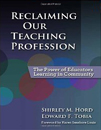 |
Reclaiming Our Teaching Profession (2011) This book shows educators how to use the transformative power of professional learning in community to raise the professional stature of educators. The authors provide clear steps and real-school examples with a focus on collaborative adult learning ... |
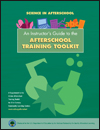 |
Science in Afterschool: An Instructor's Guide to the Afterschool Training Toolkit (2008) The five promising practices in afterschool for science identified in the Afterschool Training Toolkit are as follows: Investigating Science Through Inquiry; Exploring Science Through Projects and Problems; Integrating Science Across the Curriculum; ... |
 |
Stages of Concern Questionnaire (SoCQ) Online (2008) This online version of the Stages of Concern Questionnaire enables researchers and evaluators to use their computers to score questionnaires; analyze the results; and produce multiple types of reports, including individual, total-sample, and ... |
 |
Taking Charge of Change (2006; 2nd printing, with minor additions and corrections, 2008; revised version uploaded on Lulu.com, 2014.) This easy-to-read introduction to the Concerns-Based Adoption Model is a cornerstone in the school-change literature. The book provides concepts, tools, and techniques that educators can use to facilitate school change and improvement programs. |
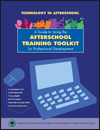 |
Technology in Afterschool: A Guide to Using the Afterschool Training Toolkit for Professional Development (2008) This guide focuses on using a practical staff development model for learning about the six technology practices featured in the Afterschool Training Toolkit and how they can support learning. Each technology practice is introduced with two to four ... |
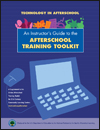 |
Technology in Afterschool: An Instructor's Guide to the Afterschool Training Toolkit (2008) The six promising practices in afterschool technology identified in the Afterschool Training Toolkit are as follows: Developing Self-Expression and Creativity; Gathering and Sharing Information; Finding and Solving Problems; Living and Working With ... |
 |
The Problem with Math Is English (2012) This publication illustrates how students often understand fundamental mathematical concepts at a superficial level. Written to inspire aha moments, the book enables teachers to help students identify and comprehend the nuances and true meaning ... |
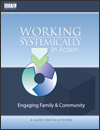 |
Working Systemically in Action: Engaging Family & Community (2010) Many educators recognize the importance of family and community involvement in school improvement efforts and are seeking to reframe the way they engage these groups. This publication, which supplements Working Systemically in ... |
